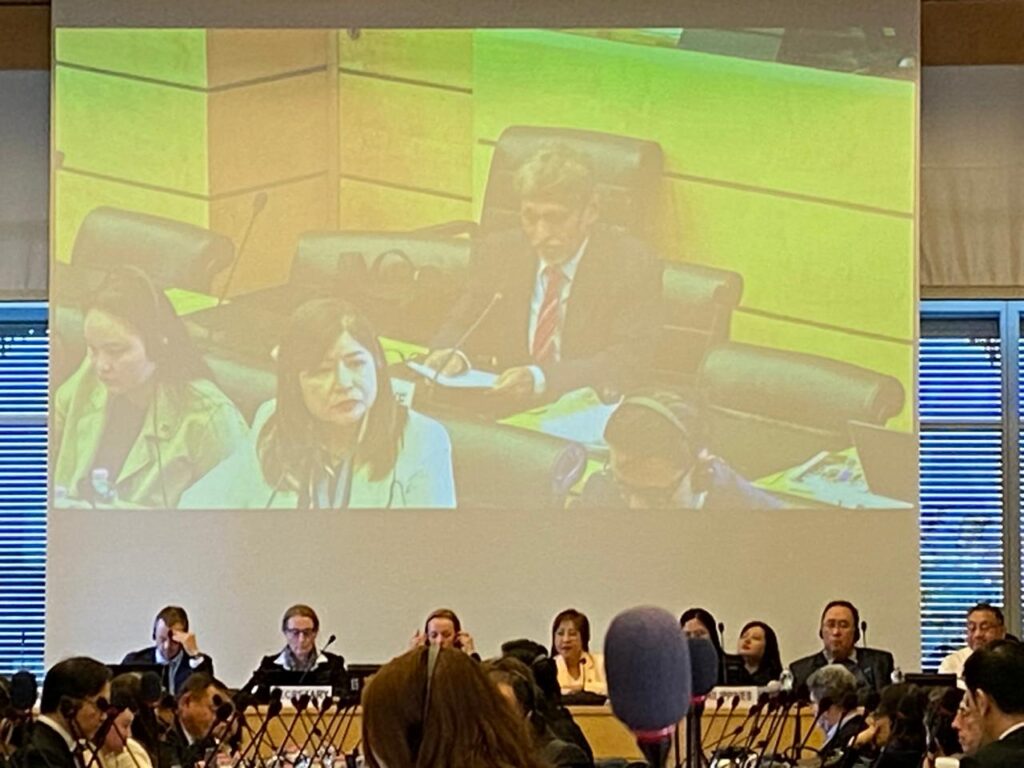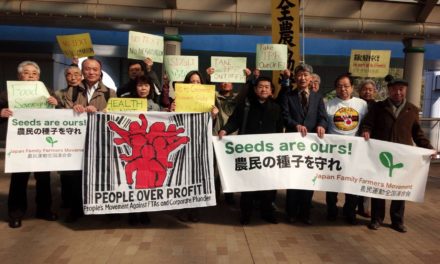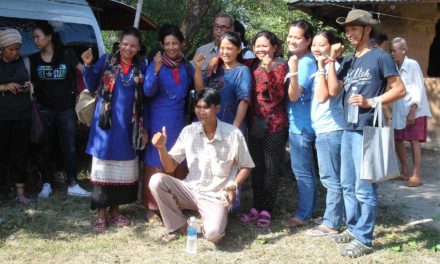
Country Rapporteur Asraf Ally Caunhye from Mauritius raises initial questions and comments from the Committee on Economic Social and Cultural Rights to the Philippine delegation. Geneva . 18 February 2025.
To the Committee-
Good afternoon . My name is Joseph Purugganan, Co-Director of Focus on the Global South, speaking here on behalf of the in Defense of Human Rights and Dignity Mocement or IDEFEND. We thank the committee for this opportunity to present our views on the ESCR report submitted by the Philippine government.
IDEFEND’s submission draws upon the inputs from grassroots organizations advocating for the realization of economic, social, and cultural rights, with a particular focus on marginalized populations.
The 7th periodic review takes place amidst significant and on-going political shifts following the election of Ferdinand Marcos Jr. in 2022, succeeding the administration of Rodrigo Duterte, under which the OHCHR reported “widespread and systematic human rights violations,” related but not limited to the anti-drug campaign.
We would like to underscore three key assessment points, which paint a very different picture of the ESCR situation in the Philippines from that presented by the government.
First, in the midst of multiple crises – on food, climate, public health, governance and human rights– affecting disproportionately the poor and marginalized, we find that the government is falling short of its ESCR obligations.
As the Committee underscored previously, when clarifying minimum core obligations, it is important to look at the levels of deprivation on essential foodstuffs, primary health care, basic shelter and housing, or of the most basic forms of education when assessing these state actions.
For example the UN’s latest State of Food Security and Nutrition in the World report showed there were 50.9 million people who did not have constant access to adequate food in the Philippines in 2022.
On shelter, the World Population Review estimates that there are around 4.5 million homeless people in the country. In addition, of the total number of homeless people, about 250,000 are children in street situations (CISS), or children living in the streets or in shanties in slum communities.
On essential healthcare, about half of Filipinos do not have timely access to primary healthcare facilities. Public health spending in the Philippines is one of the lowest in the ASEAN region. The WHO reported that the country spends only about 1.5 percent of its GDP on health, which is significantly lower than that of its neighbors in Southeast Asia.
The Commission on Population and Development (CPD) has sounded the alarm over the rising incidence of adolescent pregnancies. According to the World Bank, 47 in 1,000 births are by teenage girls, citing poverty and lack of education as the main reasons for this.
These are clearly significant numbers, constituting “prima facie failure to discharge obligations under the Covenant.
Second, the government has failed to create the conditions conducive to the realization of these rights, by failing to address, allowing or being complicit to the attacks against rights defenders.
We continue to witness incidents of red tagging/terror tagging, SLAPP suits, criminalization and reprisals against indigenous, land and environmental rights defenders.
The farmers in Sumalo, Bataan continue to face reprisals from a private corporation because they chose to assert their land rights. Their organization, mostly led by women farmers, face over 50 SLAPP cases ranging from cyber libel, trespassing to syndicated estafa.
The UNSR on the Independence of judges and lawyers Margaret Satterthwaite in her October 2024 report , said SLAPP suits constitute a “weaponization of the justice system to serve private interests at the expense of legitimate human rights objectives.”
Recently a prominent activist, running for a Partylist seat in Congress Lejun Dela Cruz survived an assassination attempt by the police. Failing to kill him, he was severely beaten and then arrested on trumped up charges.
According to Global Witness, the Philippines remains one of the most dangerous places for land,environment and indigenous rights defenders.
Third, By advancing a corporate-driven development agenda the government has undermined the realization of these rights, and in some instances enacted measures that constitute a retrogression of its obligations.
We see a growing corporate capture of economic policies reflecting a strong bias in favor of business interests over people’s rights.
With the lifting of the mining moratorium by Duterte, the Marcos administration has approved mining permits, and actively made efforts to further streamline mining applications. As a result, 349 mining permits were approved in 2023.
The Philippines has yet to develop a National Action Plan on Business and Human Rights. The Philippine report neglects to mention its support for UNHRC Resolution 26/9 mandating negotiations towards a stronger, legally binding instrument to regulate TNCs and other business enterprises with respect to human rights.
The recent Supreme Court decision removing the regulation over the 15km municipal fishing waters has effectively reversed the long held social justice policy of affording preferential access to poor and marginalized fishers in the use of fisheries and marine resources.
Concluding Remarks and Recommendations
To conclude, the high incidence of poverty, inadequate wages, rising food insecurity continue to undermine the well-being of the poor and marginalized Filipino people. Legislative efforts have proven inadequate in addressing the underlying structural issues that perpetuate inequality. Economic disparities persist, leaving a significant portion of the population unable to fully enjoy their basic rights to food, health, housing, and education.
It is then imperative that the government immediately passes laws that would break down the barriers to the enjoyment of these rights, such as the Prevention of Adolescent Pregnancy bill.
The government’s reliance on neoliberal economic policies that prioritize corporate interests over the welfare of the people actively hinder the fulfillment of ESCR for the most vulnerable communities, exacerbating their poverty and marginalization.
It is therefore critical that the government takes more decisive action in guaranteeing these rights. This includes ratifying the Optional Protocol of the ICESCR, which will enable individuals to seek justice at the international level when domestic remedies fail. Protection for human rights defenders must be reinforced, including ceasing all attacks and intimidation.
We call on Congress to urgently pass the CHR charter to strengthen, and broaden the Commission’s mandate and capacity, paving the way for the establishment of a National Preventive Mechanism (NPM) to further promote, protect, and advocate for human rights in the Philippines
Accountability for perpetrators, particularly corporations that violate human rights, must be a priority, ensuring that they are held responsible for abuses against indigenous peoples and environmental defenders. We urge the Philippine government to exert stronger effort in supporting the legally binding instrument on TNCs.
We demand as well the urgent passage of the Human Rights Defenders protection law and move to strengthen existing and enact new anti-SLAPP rules, procedures and policies.
The abolition of agencies such as NTF-ELCAC and the repeal of the Anti Terrorism Law are essential in dismantling a system that perpetuates violations under the guise of national security.
Only through these actions can the Philippine government begin to genuinely realize the Economic, Social, and Cultural Rights of its people, enabling a future where every Filipino, regardless of their socio-economic status or background, can live a life of dignity, opportunity, and security.
Thank you.









